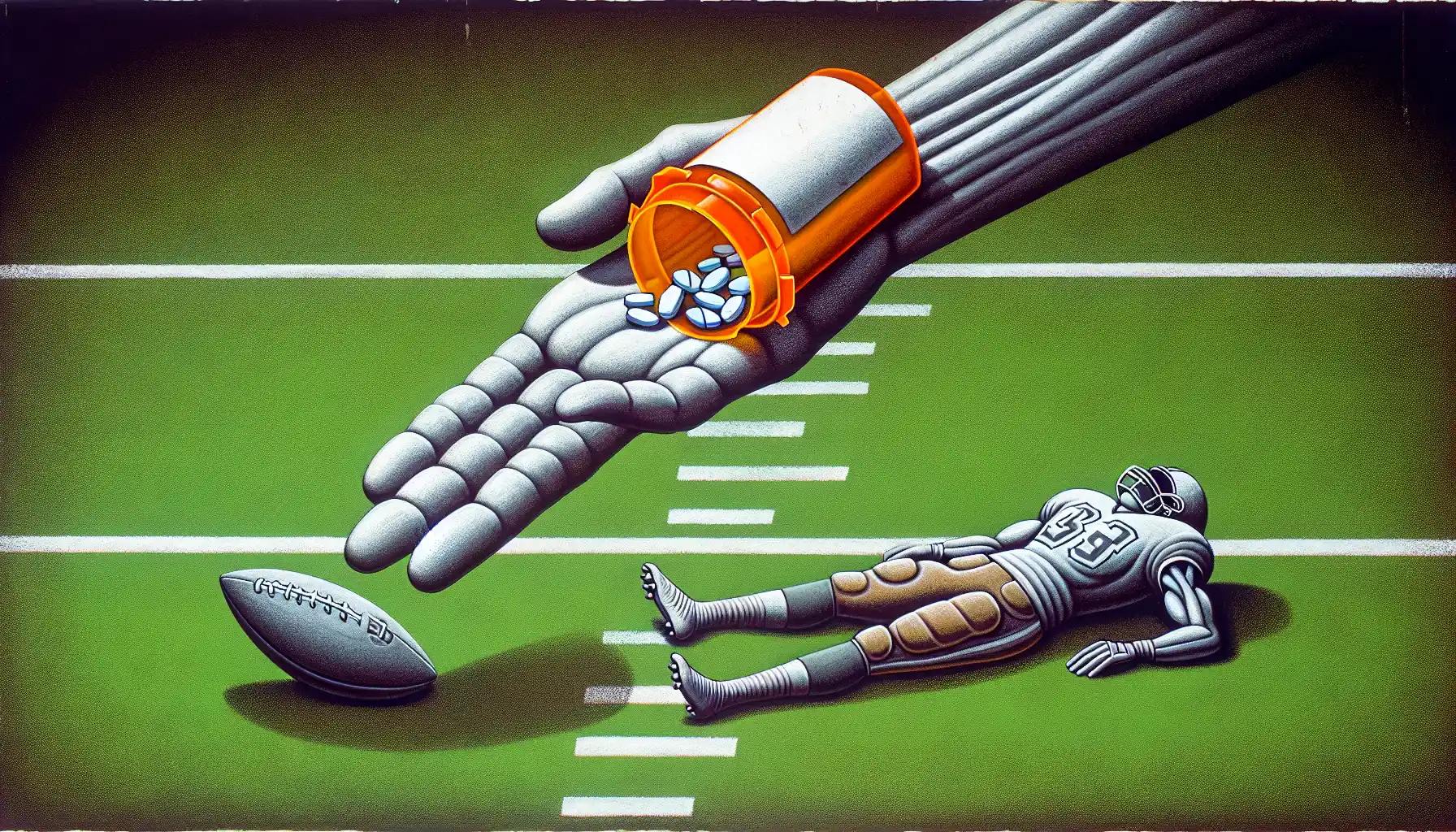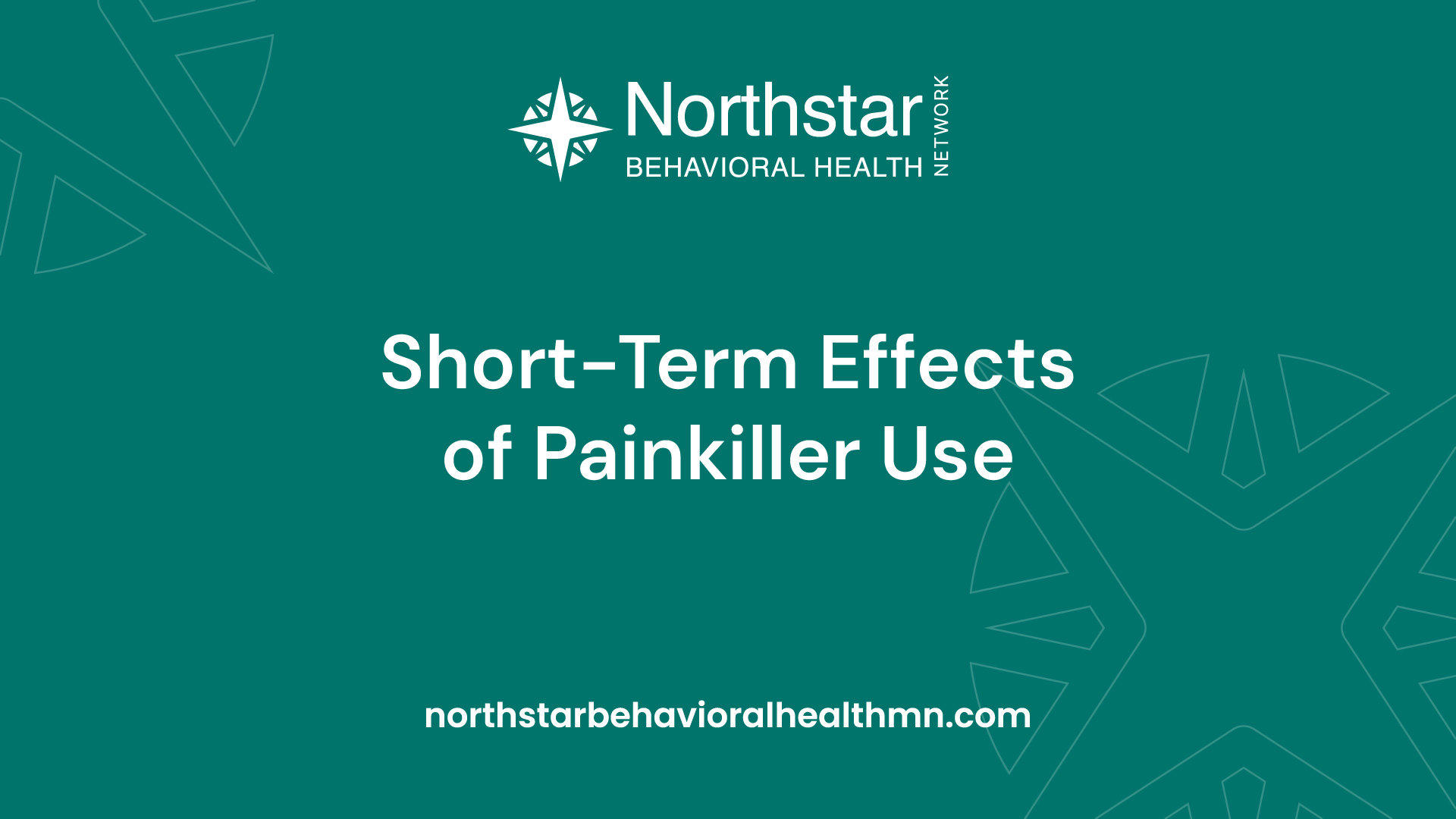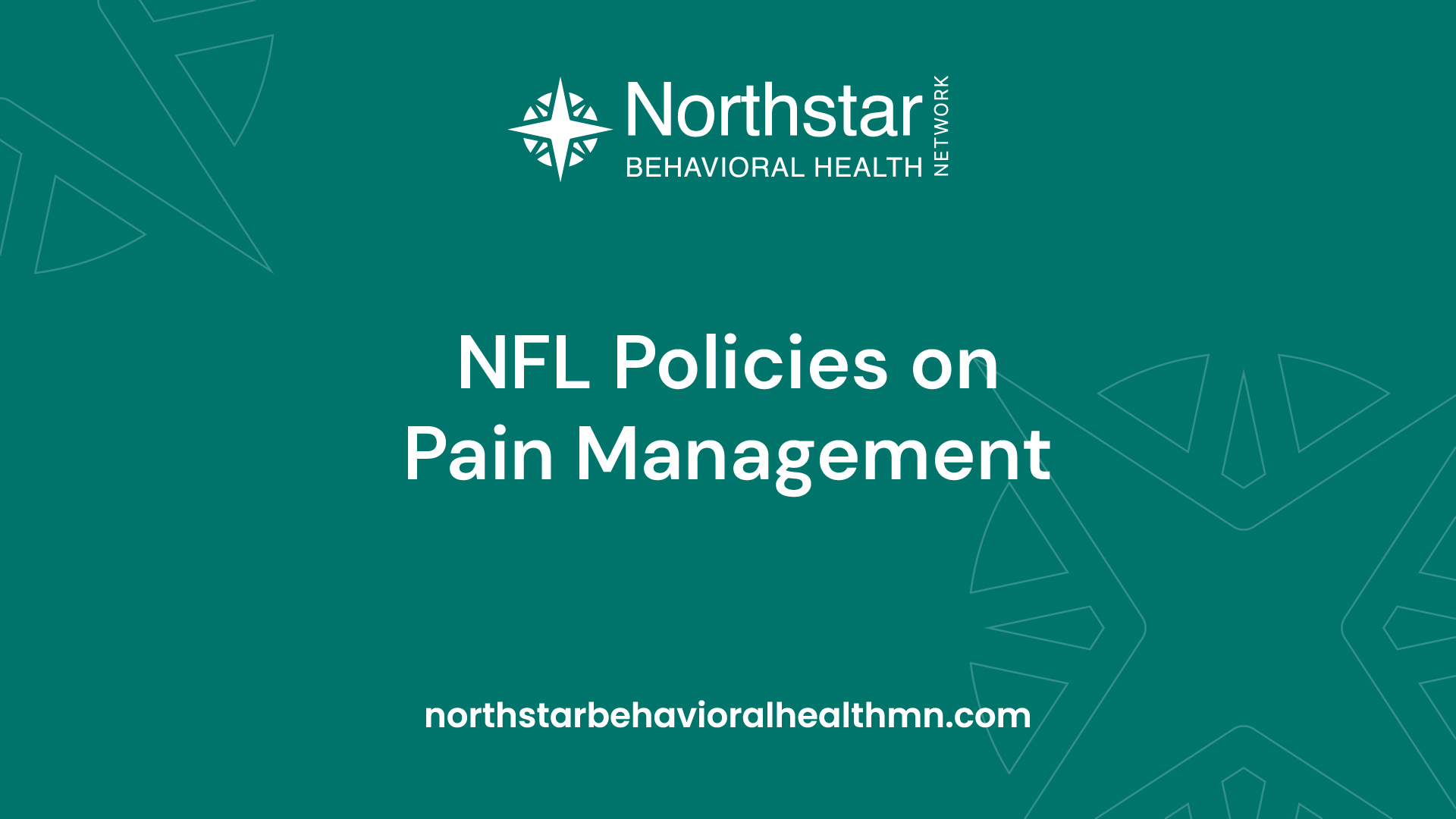August 27, 2024
The Dark Side Of The NFL: Painkiller Practices
Discover the truth behind pain management in football.


Painkiller Practices in the NFL
Professional football is a physically demanding sport that often takes a toll on the players' bodies. To manage the pain and injuries associated with the game, the use of painkillers has become prevalent in the NFL. This section provides an overview of painkiller use in the NFL and highlights the concerns and controversies surrounding this practice.
Overview of Painkiller Use in the NFL

Painkiller use in the NFL is a common practice aimed at helping players manage the pain caused by injuries sustained during games and practices. These painkillers, including opioids and other prescription medications, are often administered to players to enable them to continue playing despite their injuries.
The use of painkillers in the NFL is driven by the high physical demands of the sport and the pressure placed on players to perform at their best. In many cases, players rely on painkillers as a means to stay on the field and fulfill the expectations placed upon them by their teams and fans.
Concerns and Controversies
While painkillers may provide temporary relief, concerns have been raised about the potential risks and consequences associated with their use in the NFL. Some of the main concerns include:
- Addiction: The prolonged use of painkillers can lead to dependency and addiction, putting players at risk of experiencing serious health issues both during and after their football careers.
- Masking Injuries: Painkillers can mask the pain associated with injuries, potentially leading players to continue playing and exacerbating their injuries without proper medical attention.
- Long-Term Health Effects: The long-term use of painkillers, especially opioids, can have detrimental effects on players' overall health. These effects may include organ damage, mental health issues, and an increased risk of substance abuse.
- Ethical Considerations: The reliance on painkillers raises ethical questions regarding the duty of team physicians and medical staff to prioritize player health and safety over the pressure to keep players on the field.
The prevalence of painkiller use in the NFL has sparked conversations and debates about the overall well-being and long-term health of players. Efforts have been made by the league to address these concerns and promote player safety. To learn more about the policies and regulations in place regarding pain management in the NFL, continue reading our article on NFL policies on pain management.
It is important for the NFL and its stakeholders to continue evaluating painkiller practices and exploring alternative methods to manage pain effectively while prioritizing the health and well-being of the players.
The Pressure on Players
Within the world of professional football, players face immense pressure and high performance demands. This pressure can have a significant impact on various aspects of their lives, including pain management.
Expectations and Performance Demands
In the highly competitive environment of the NFL, players are expected to perform at their best, week after week. They face intense physical challenges and must constantly push their bodies to the limits. The pressure to succeed and meet the expectations of coaches, teammates, and fans can be overwhelming.
To excel on the field, players often need to play through injuries and manage pain effectively. The desire to contribute to the team's success and secure their position on the roster can lead players to prioritize performance over their own physical well-being.
Influence on Pain Management
The pressure to perform can significantly influence how players manage pain. They may feel compelled to mask their pain or push through injuries to continue playing. This can lead to a heavy reliance on painkillers to numb the discomfort and allow them to stay in the game.
While painkillers can provide temporary relief, they come with risks and potential side effects. The use of painkillers without proper medical supervision can lead to dependency and addiction. It's important for players to have access to comprehensive pain management strategies that prioritize their long-term health and well-being.
To address this issue, the NFL and its medical staff have a crucial role in ensuring the proper balance between pain management and player safety. The responsibilities and ethical considerations of team physicians are explored further in the section on the role of team physicians. Additionally, efforts towards player safety through league policies and regulations are discussed in the section on NFL policies on pain management.
By recognizing and addressing the pressure placed on players, the NFL can work towards creating an environment that prioritizes the health and well-being of its athletes. This includes implementing safer practices and providing support systems to help players manage pain effectively without compromising their long-term health.
The Role of Team Physicians
When it comes to painkiller practices in the NFL, the role of team physicians is a crucial aspect to consider. These healthcare professionals play a significant role in the medical care and treatment of players. Let's explore their responsibilities and the ethical considerations they face, as well as the challenges they encounter.
Responsibilities and Ethical Considerations
Team physicians in the NFL have a primary responsibility to provide medical care to players, including the management of pain. They are tasked with evaluating injuries, diagnosing conditions, and prescribing appropriate treatments. In the context of pain management, team physicians often face a delicate balance between relieving players' pain and ensuring their overall health and safety.
Ethically, team physicians are expected to prioritize the well-being of the players. This includes considering the potential risks and benefits of painkiller use, as well as exploring alternative treatments that may be less harmful. They must adhere to medical guidelines and ethical standards, ensuring that the treatment decisions are based on professional judgment and not influenced by external pressures.
It is important to note that team physicians are not the sole decision-makers when it comes to painkiller practices. They often work in collaboration with other medical staff, such as athletic trainers and team doctors, to ensure comprehensive care for the players. This multidisciplinary approach allows for a more holistic evaluation of pain management strategies.
Challenges Faced by Medical Staff
The role of team physicians in managing pain in the NFL is not without its challenges. These medical professionals often face pressure from various sources, including coaches, team management, and even players themselves. The demands to keep players on the field and perform at their peak can sometimes overshadow the long-term health consequences of painkiller use.
In addition to external pressure, team physicians must navigate the complexities of treating professional athletes with unique physical demands. They must consider the potential interactions between pain medications and other treatments, such as rehabilitation protocols or surgical interventions. Striking the right balance between pain relief and minimizing the risk of addiction or other complications can be a delicate task.
Moreover, team physicians may face challenges in effectively communicating the risks and benefits of painkiller use to players. Ensuring that players are well-informed about the potential dangers and alternatives to painkillers is crucial for their decision-making process.
By understanding the responsibilities and ethical considerations faced by team physicians, as well as the challenges they encounter, we can gain insight into the complex landscape of painkiller practices in the NFL. It is essential for all stakeholders involved in player care to collaborate and prioritize the long-term health and well-being of athletes while effectively managing pain.
Impact on Player Health
The use of painkillers in the NFL can have significant effects on the health of football players. These effects can manifest in both the short-term and long-term, raising concerns about the well-being of the athletes.
Short-Term Effects of Painkiller Use

In the short-term, painkiller use can provide temporary relief for players dealing with injuries and pain. These medications can help mask the discomfort, allowing players to continue participating in games and practices. However, relying on painkillers to push through injuries can have detrimental effects.
One of the main concerns is the potential for further injury. Painkillers can mask pain signals that serve as warning signs for serious underlying issues. By numbing the pain, players may unknowingly aggravate their injuries, leading to more severe and long-lasting damage.
Furthermore, painkillers can also affect cognitive function and reaction time. Some medications may cause drowsiness, impairing a player's ability to make split-second decisions on the field. This can increase the risk of accidents and further injuries, not only for the player but also for others involved in the game.
Long-Term Health Consequences
The long-term health consequences of painkiller use in the NFL are a major concern. Prolonged and excessive use of painkillers can lead to a range of health problems, including addiction, organ damage, and mental health issues.
Addiction is a significant risk associated with painkiller use. Football players, facing immense pressure to perform and manage their pain, may develop a dependence on these medications. This can lead to a cycle of addiction, affecting not only their career but also their personal lives. It is crucial for players to seek help and support if they find themselves struggling with addiction. Resources such as drug rehab programs can assist in recovery.
Painkillers can also cause damage to vital organs like the liver and kidneys. Over time, the cumulative effects of painkiller use can contribute to organ dysfunction and increase the risk of developing serious medical conditions.
Mental health issues can also arise as a result of painkiller use. The pressures of the game, combined with the potential for addiction and physical pain, can take a toll on a player's mental well-being. It is essential for players to have access to proper support systems and resources to address any mental health concerns that may arise.
Understanding the impact of painkiller use on player health is crucial in addressing the issues faced by NFL athletes. By raising awareness and advocating for safer practices, the league can work towards ensuring the overall well-being of its players.
League Policies and Regulations
When it comes to pain management in the NFL, there are specific policies and regulations in place to ensure the health and safety of players. Let's take a closer look at the NFL's policies on pain management and their efforts towards player safety.
NFL Policies on Pain Management

The NFL has guidelines and protocols in place to regulate the use of painkillers and other medications by players. The league recognizes the importance of pain management for athletes who may experience injuries and physical discomfort as a result of their demanding sport.
The NFL's policy on pain management emphasizes the importance of medical supervision and the use of prescription medications. Players are required to follow the advice and treatment plans provided by team physicians and medical staff. This policy aims to ensure that players receive appropriate medical care and minimize the risk of abuse or misuse of painkillers.
Additionally, the NFL has implemented a comprehensive drug testing program to monitor the use of substances, including pain medications, by players. This program includes both random and scheduled testing to deter the use of banned substances and ensure compliance with league policies.
Efforts Towards Player Safety
In recent years, the NFL has taken significant steps to prioritize player safety and address concerns related to pain management. The league has invested in research and initiatives aimed at improving player health and reducing the potential risks associated with painkiller use.
Efforts towards player safety include advancements in injury prevention and treatment methods, as well as increased education and awareness programs for players, coaches, and medical staff. The NFL actively collaborates with medical experts and organizations to develop best practices and guidelines for pain management.
Player safety is a key consideration in the ongoing discussions and negotiations between the NFL and the NFL Players Association (NFLPA). Both entities work together to address concerns related to painkiller practices and ensure that players receive proper medical care while minimizing the potential risks associated with pain management.
By implementing policies on pain management and prioritizing player safety, the NFL aims to strike a balance between providing effective medical treatment for players and safeguarding their long-term health and well-being.
Understanding the league's policies and ongoing efforts towards player safety is crucial in comprehending the complex landscape of painkiller practices in the NFL. By working towards safer practices and fostering a culture of transparency and accountability, the league continues to evolve and address the challenges associated with pain management in professional football.
Seeking Solutions
The concerning painkiller practices in the NFL have raised awareness and sparked a call for safer practices and better support for player well-being. Various individuals and organizations have taken up the responsibility to advocate for change and ensure the health and safety of football players.
Advocacy for Safer Practices
Numerous voices within the sports community and beyond have been advocating for safer pain management practices in the NFL. Former players, medical professionals, and organizations have come forward to raise awareness about the risks associated with excessive painkiller use and the need for alternative approaches.
Advocates argue for a shift towards a more holistic approach to pain management, focusing on comprehensive care that prioritizes players' long-term health over immediate performance. This includes exploring non-pharmacological treatments, such as physical therapy, acupuncture, and mindfulness-based practices, to reduce reliance on painkillers.
By addressing the underlying causes of pain and implementing safer practices, players can receive the care they need without compromising their overall well-being.
Support for Player Well-Being
Recognizing the importance of supporting player well-being, both on and off the field, the NFL and various player associations have taken steps to enhance player care and provide resources for those in need. Efforts have been made to improve overall player safety, including increased funding for research on injury prevention and the development of protocols to ensure proper medical care.
Additionally, initiatives have been introduced to support players in addressing pain management concerns and seeking help for potential addiction issues. The NFL and player associations have established programs that offer education, counseling, and confidential assistance to players struggling with painkiller dependency or other substance abuse problems. These resources aim to provide a supportive environment and encourage players to seek the help they need.
By advocating for safer practices and providing support for player well-being, the NFL and relevant stakeholders are taking steps in the right direction. However, continued collaboration and ongoing efforts are necessary to ensure that players receive the care they deserve while minimizing the potential risks associated with painkiller practices.
For more information on related topics, such as the impact of prescription drug abuse or educating kids about drugs, please refer to our articles on an alarming number of teens driving under the influence of alcohol or drugs and twelve tips for educating kids about drugs.

.jpg)




.jpg)

